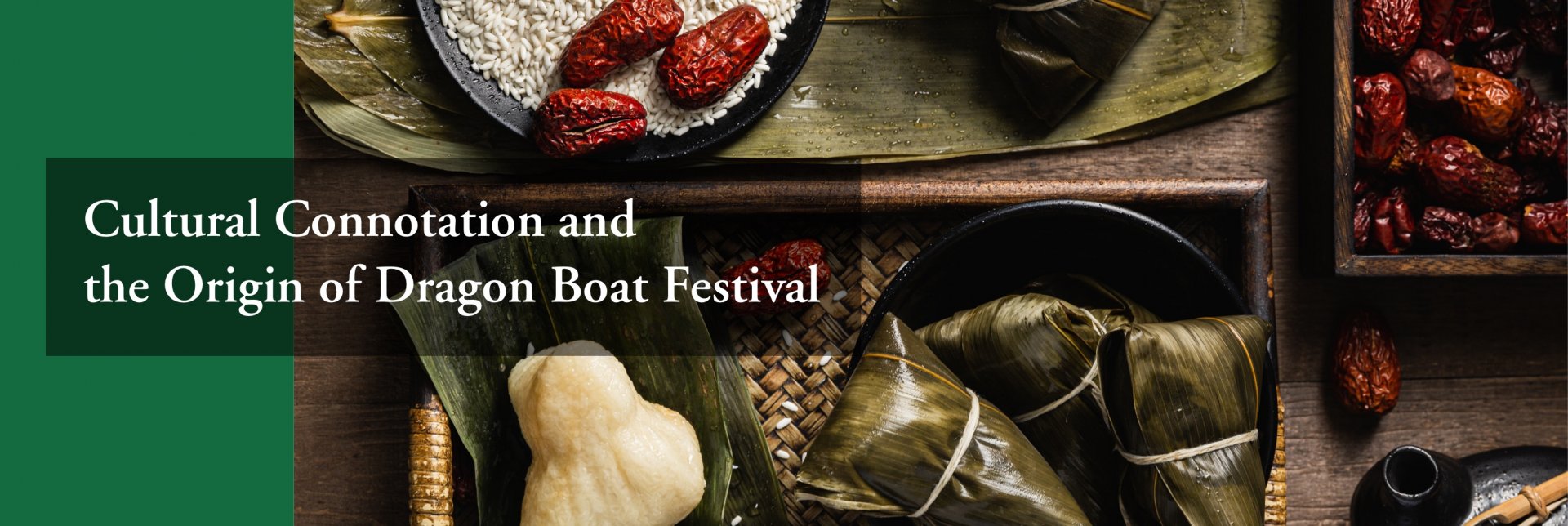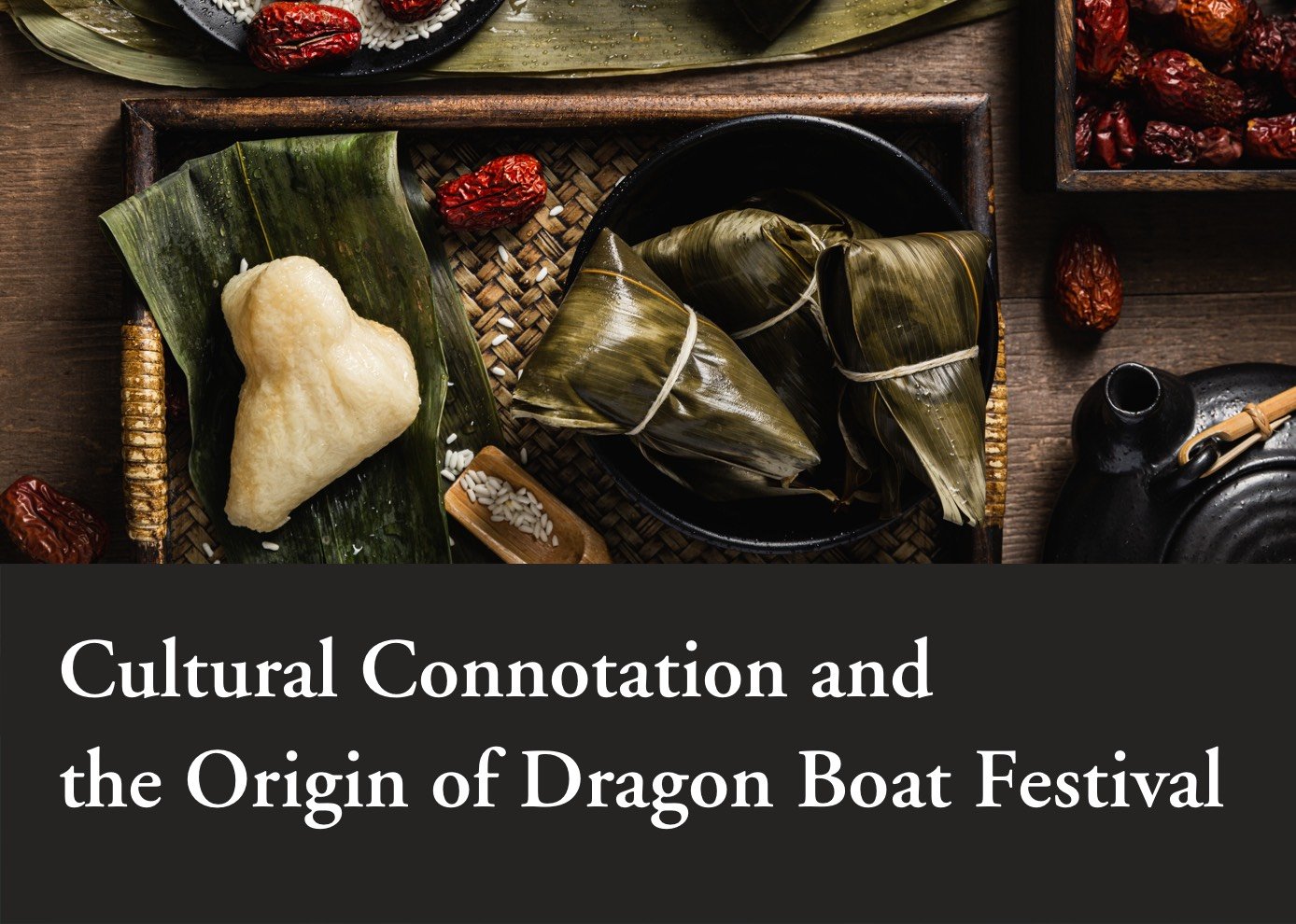Cultural Connotation and the Origin of Dragon Boat Festival
As Dragon Boat Festival approaches, my memories are stirred once again. During my childhood, while my elders were making rice dumplings, I used to ask them about the origins and significance of the festival. Their answer was always the same: "It's the festival to commemorate Qu Yuan (屈原,343 – 278 BC)." However, this brief explanation was not enough to quell my doubts. Why is the Dragon Boat Festival called "Duan Wu" (端午,the Chinese name of Dragon Boat Day)? Why is Qu Yuan remembered? And do the customs of the Dragon Boat Festival relate to Qu Yuan? It was only as I grew older that I came to understand the history and significance of the festival through documented literature.

The Narrative of Social Customs and Natural Conditions (《風土記》), written by Zhou Chu (周處,236 - 297) in the early years of the Western Jin Dynasty (西晉), records that "People stew duck and rice dumplings on the fifth day of the second month in summer. 'Duan (端)' means 'Start', so people called the fifth day of the fifth month on the Lunar Calendar as 'Duan Wu (端五)'" ("仲夏端五,烹鶩角黍,端,始也。謂五月初五日也。").1 As "Duan (端)" means beginning in the ancient Chinese system, and the "month of Wu (午月)" of the Stems-and-Branches system (天干地支,an ancient Chinese system used to record dates) corresponds to the fifth month of the year, ancient Chinese people preferred to celebrate the festival on the first "day of Wu (午日)" in the "month of Wu," calling it the "Duan Wu Festival" (端午節), the Chinese name for the Dragon Boat Festival. The Chinese folklorist Huang Shi (黃石,1901 - ?) believed that since the Wei and Jin dynasties (魏晉時期), the Chinese people started to record data with numbers instead of the complicated Stems-and-Branches system. In this way, the Duan Wu Festival was set on the 5th day of the 5th month on the Lunar Calendar.2 In addition, since "Wu" (午) belongs to "Fire (火)" in the Five Elements Theory (五行學說), the ancient people thought that the first "day of Wu" of "the Month of Wu" (午月)" had the most powerful Yang spirit (陽氣), and they also called the Duan Wu Festival the Duan Yang Festival (端陽節), another name for the Dragon Boat Festival in Chinese.
Since ancient times, making rice dumplings and rowing dragon boats have been customs associated with the Dragon Boat Festival. The Narrative of the Customs in the Region of Jin and Chu (《荊楚歲時記》), written during the Southern Liang dynasty (南朝梁), records the source of the dragon boat race: "Qu Yuan drowned himself in the Miluo River (汨羅江) on that day. People were saddened by his death, so they brought boats and paddles to search for and save him. The custom of boat racing (on the fifth day of the fifth month on the Lunar Calendar) at present is a continuation of the past" ("屈原以是日死於汨羅,人傷其死,所以並將舟楫以拯之,今之競渡,是其遺跡。").3 The story in the mystery novel during the same period, Continuation of Mysteries Tales (《續齊諧記》), showed the variation of rice dumplings. People used to commemorate Qu Yuan by immersing thick bamboo tubes filled with rice (the rudiment of dumplings) during the Warring States Period (戰國時期). By the Eastern Han Dynasty, people started to use leaves and five-colored ropes to make rice dumplings.4 Additionally, wearing five-colored ropes and sachets, gathering herbs, bathing with eupatorium fortunei (蘭草),5 and hanging wormwood (艾草)6 were also customs associated with the Dragon Boat Festival in ancient China, which implied wards of disease and evil.

The Research of Chinese Customs (《風俗通義》) is the earliest source material that records Qu Yuan as the originator of the Dragon Boat Festival.7 It says, "People tie up five-colored ropes on their arms to avoid war, ghosts, and disease on the fifth day of the fifth month in the Lunar Calendar. This festival also originated from Qu Yuan." (“五月五日,以五綵絲繫臂者,辟兵及鬼,令人不病溫,亦因屈原。”)8 The ancient material also shows a different origin of the Dragon Boat Festival. Cai Yong (蔡邕,671 – 628 BC) in Tales of Seven-string Qin Music (《琴操》) linked the festival with Jie Zisui (also called Jie Zitui,介子綏,? - 636 BC), who was the assistant of Chong Er (重耳,also known as Duke Wen of Jin 晉文公,697 – 628 BC), who helped Chong Er take the duke crown of Jin State (晉國,the state name during the Spring and Autumn period). After Chong Er's enthronement, Jie Zisui disagreed with the allocation of awards and Chong Er's way of handling country affairs, so he chose to retire from political life to a remote mountain. Chong Er tried to burn the mountain to force Jie Zisui back to court. Unexpectedly, Jie Zisui chose to be burned to death. To commemorate Jie Zisui, Chong Er announced that lighting fire was forbidden on the fifth day of the fifth month.9 Moreover, Cao E (曹娥,130 - 143) was identified as the origin of the festival. According to Bibliography of Historical Heritage in Kuai Ji Country (《會稽典錄》), Cao E's father drowned in the Shun River (舜江) when she was only fourteen. To find her father's remains, she searched along the river crying for seven consecutive days, then jumped into the river.10 In recognition of her filial piety, a monument and temple were established for her.11 Her story was deemed the origin of the Dragon Boat Festival.
Apart from these legends of the festival's origin from ancient books, modern scholars started to trace its source. Wen Yiduo (聞一多,1899 - 1946) combined research on literature and culture in the Wu and Yue regions (吳越地區) to draw a conclusion: the Dragon Boat Festival originated from sacrificial activities based on the belief in dragons in the Wu and Yu regions.12 Huang Shi (黃石) deduced that the customs of the Dragon Boat Festival originated from the desire for survival. Chinese people hoped to use the festival's rites to avoid disasters and diseases.13 Li Yiyuan (李亦園,1931 - 2017) and Li Shaoyuan (李少園,1937 - 2013) started from a new perspective based on human activities and seasonal variation. They concluded that the Dragon Boat Festival is a seasonal rite. As the festival falls at the node of seasonal change, it passes on the message of seasonal change to the people.14

As opinions vary, no unanimous conclusion can be drawn. However, each of these perspectives has reached an agreement: the Dragon Boat Festival contains the wisdom and cultural traditions of ancient China. The name "Duan Wu (端午)" comes from the Five-Element Theory and the Twenty-four Solar Terms, which were the ways ancient Chinese people understood the world and established the time system. These two theories also symbolized the development of ancient Chinese society from primitive society to agricultural society. Additionally, the legends on the origin of the Dragon Boat Festival in ancient China, which involve Qu Yuan, Jie Zisui, and Cao E, are far-fetched. Nevertheless, these legends displayed the pursuit and worship of traditional Chinese virtues. Qu Yuan was patriotic and loyal to his country and monarch but was excluded from the court by traitorous ministers and tormented himself with suspicion from his monarch. He drowned himself in the river after his motherland, Chu State (楚國), was annihilated by Qin State (秦國). Jie Zisui (介子綏) was indifferent to fame and wealth, retired at the height of his career, and rather resented his Chong Er when faced with unfair treatment. Both symbolized the faithfulness (忠) and righteousness (義) in Chinese traditional culture. On the other hand, their monarchs, King Qingxiang of Chu (楚頃襄王,298 – 263 BC) and Duke Wen of Jin(晉文公), are negative examples that alert common people to stay close to worthy individuals and keep away from mean fellows, while also giving ear and acceptance to suggestions from others. The idea of the festival's origin from Cao E revealed the concept of filial piety and the pursuit of domestic peace in Chinese traditional culture.

As the eve of the Dragon Boat Festival approaches, people welcome the arrival of the festival and look forward to the dragon boat regattas in Hong Kong, a city where Chinese traditions and Western culture mix. The meaning of the Dragon Boat Festival is not only to commemorate historical figures but also to show people's expectations and wishes for a beautiful life. This feeling makes the festival full of energy and shine in this city.
Note:
1. 歐陽詢(557 - 641年)撰,汪紹楹校:《藝文類聚 上》(北京:中華書局,1965年),頁75。
2. 黃石:《端午禮俗史》(香港:泰興書局,1963年),頁5。
3. 同[1],頁74。
4. 同[1],頁74。
5. 李昉(925年 – 996年)撰,夏劍欽校:《太平御覽 第一卷》(石家莊:河北教育出版社,2000年),頁268 – 270。
6. 同[1],頁75。
7. 劉曉峰:《端午》(北京:生活·讀書·新知三聯書店,2010年),頁58。
8. 同[1],頁75。
9. 蔡邕:《琴操》(北京:中華書局,1985),頁16。
10. 同[1],頁74-75。
11. 班超(32年 - 102年)著,許嘉璐編:《後漢書》(上海:漢語大詞典出版社,2004),頁168;金廷棟(生卒年不詳):《曹江孝女廟志》(五社公所,1882),HatiTrust Digital Library(https://babel.hathitrust.org/cgi/pt?id=hvd.32044068333202&view=1up&seq=11),2023年3月18日發佈。(瀏覽日期:2023年6月1日)
12. 聞一多著,王建輝編:《聞一多全集 5 楚辭編·樂府詩編》(武漢:湖北人民出版社,1993)頁31 - 46。
13. 黃石:《端午禮俗史》(香港:泰興書局,1963),頁218 – 231。
14. 李亦園;李少園:〈端午與屈原:傳說與儀式的結構關係再探〉,中國神話與傳說學術研討會論文集,1996。
Reference
Book
1. 李昉撰,夏劍欽校:《太平御覽 第一卷》(石家莊:河北教育出版社,2000年)。
2. 班超著,許嘉璐編:《後漢書》(上海:漢語大詞典出版社,2004年)。
3. 黃石:《端午禮俗史》(香港:泰興書局,1963年)。
4. 聞一多著,王建輝編:《聞一多全集 5 楚辭編·樂府詩編》(武漢:湖北人民出版社,1993年)。
5. 歐陽詢撰,汪紹楹校:《藝文類聚 上》(北京:中華書局,1965年)。
6. 蔡邕:《琴操》(北京:中華書局,1985年)。
7. 劉曉峰:《端午》(北京:生活·讀書·新知三聯書店,2010年)。
Journal Article
1. 李亦園;李少園:〈端午與屈原:傳說與儀式的結構關係再探〉,中國神話與傳說學術研討會論文集,1996。
Electronic Resource
1. 金廷棟:《曹江孝女廟志》(五社公所,1882),HatiTrust Digital Library(https://babel.hathitrust.org/cgi/pt?id=hvd.32044068333202&view=1up&seq=11),2023年3月18日發佈。(瀏覽日期:2023年6月1日)
All articles/videos are prohibited from reproducing without the permission of the copyright holder.




Welcome to leave a message:
Please Sign In/Sign Up as a member and leave a message